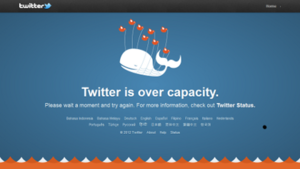Few days ago, I gave a 4-hours talk in Bari for the initiative sponsored by Italian government and 4 universities “Imprenditori si diventa” (Entrepreneurs are made, not born). The presentation is embedded below.
It was a very interactive talk and I enjoyed it very much. I used for the first time VisibleTweets: students could write twitter messages with tag #isdsn and these tweets were automatically shown on another screen by VisibleTweets. Unfortunately not all students had a connection so it was less interactive than what I hoped but still very interesting [note for myself: VisibleTweets probably works better if the talk is given by at least two people because it is hard to read twits and talk, and the audience (as expected) challenges you and tries to “steal” the attention from you (to their witty twits)]. I also showed many videos (see the slides): from CommonCraft, from the movies Ratatouille and The pursuit of Happyness, some from Socialnomics.com and one by Corrado Guzzanti, an Italian comedian. It is incredible the power of movies in waking up your audience! ;)
The talk was full of real examples such as successes and failures in using Twitter, Facebook and other social media, both in the Italian context and worldwide (I didn’t avoid talking a bit about Wikipedia when exploring concepts such as wikinomics and crowdsourcing of course!)
There were some interesting projects by will-be entrepreneurs and I wish them all the best, for their future and the future of Italy.
Well, if you are interested in the slides, you can get them on Slideshare.


 I met some cool people: in particular
I met some cool people: in particular
 Every public tweet, ever, since Twitter’s inception in March 2006, will be archived digitally at the Library of Congress, the largest library in the world.
Every public tweet, ever, since Twitter’s inception in March 2006, will be archived digitally at the Library of Congress, the largest library in the world.![Reblog this post [with Zemanta]](https://i2.wp.com/img.zemanta.com/reblog_e.png?w=625)

